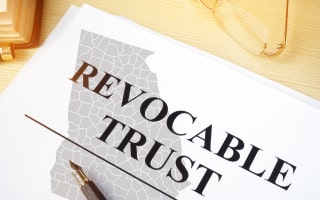How to Find Owners of Properties
in Georgia

If you want to do a property owner search in Georgia, it's good to know that public records are readily accessible. Plus, there are online tools to help you. That's because Georgia's Open Records Act gives you the right to access public records held by government agencies, whether at the state, county, or city level. This law allows you to request and obtain copies of property records in the state.
In addition, you have the option to get professional search services from a title agency or a commercial service provider.
Here are more details on how to find the owner of a property by address in Georgia:
Visit the Clerk of the Superior Court
In Georgia, the Clerk of the Superior Court keeps track of property records. This office handles deeds and mortgages and ensures each transaction is recorded and accessible to the public.
The clerk's office has the following responsibilities:
- Record Property Transactions: The office officially records property deeds to help establish and transfer ownership.
- Make Records Public: These records are open for anyone to check, so you can verify ownership or find property information whenever necessary.
You can go directly to the county's Clerk of the Superior Court to check property records. Many counties also offer an online option through the Georgia Superior Court Clerks Cooperative Authority (GSCCCA), which links up records from across the state for easy searching.
The GSCCCA site has helpful search options, including:
- Deed Indexes: Search through property records by county.
- Grantor and Grantee Searches: Look up documents by the buyer's or seller's name.
- Daily Updates: See a list of recent property transactions.
To find out more or to start a search, visit the GSCCCA website for detailed info on specific counties.
Browse Land Records Websites
Property transactions become official records through the Clerk of the Superior Court in each county. Here's how it works:
- Preparing Documents: Property owners or their representatives put together the legal paperwork, including deeds and mortgages, to record the transaction.
- Filing with the Clerk's Office: These documents are submitted to the clerk's office for official recording, either in person or online.
- Organizing Records: The clerk's office sorts these records by name, address, or document type, making them easy to locate later.
- Making Records Public: Once recorded, these documents become part of the public record and are available for anyone to access.
If you want to find the owner of a property free of charge, you can search land records statewide through the GSCCCA website. This site pulls together property records from all counties across Georgia into one convenient database.
To look up property information, you'll need some basic details:
- Name Search: Search by the seller's name (grantor) or buyer's name (grantee).
- Property Details: Enter the address, subdivision, or parcel number for specific results.
- Book and Page Number: Use this if you know the exact book and page where the record is filed.
- Document Type: Filter by document type, like a deed or mortgage.
You can search property records going back to Jan. 1, 1999, and view images of documents from counties that participate in the program.
Go to Your City or Town Assessor's Office
Local assessor's offices keep key records that are helpful for checking property values and confirming ownership. You can find the following information:
- Property Details: Information on the property's owner, technical description, and assessed value.
- Tax Records: Details on tax assessments, payment history, and any unpaid taxes.
- Land Use Information: Records on land use, zoning, and permits.
- Maps and Plats: Official maps that show property boundaries, subdivisions, and similar details.
- Homestead Exemptions: Records on tax exemptions available to qualifying homeowners.
You can visit your local assessor's office to access these records:
- Visit in Person: Check the office hours first, then stop by to request records.
- Ask for Specific Records: Request what you need, like ownership details or tax records, and have the property's address or owner's name ready.
- Complete Forms: You may need to fill out a request form or pay a small fee for copies.
- Look Online: Many counties have websites that let you search these records from anywhere.
Here are links to the assessor's offices for some of the top counties in Georgia:
- Fulton County Assessor's Office
- Gwinnett County Tax Assessor
- Cobb County Tax Assessor
- DeKalb County Tax Assessor
- Cherokee County Tax Assessor
- Hall County Tax Assessor
- Athens-Clarke County Tax Assessor
- Douglas County Tax Assessor
- Forsyth County Tax Assessor
- Paulding County Tax Assessor
Check Property Tax Records
The county tax assessor's office manages property tax records and provides important details on property ownership and taxes. A typical property tax record includes the following information:
- Current Ownership: Lists the names of the current property owners.
- Assessed Values: Shows the assessed property value, usually set at 40% of its fair market value, as determined by the County Board of Tax Assessors.
- Tax History: Includes past tax payments, unpaid taxes, or delinquencies.
- Property Description: Gives details on location, property size, and any improvements.
- Exemption Status: Lists any exemptions, such as a homestead exemption, that may apply.
If you need to look up a property tax record:
- Visit the Office: Go to your local county tax assessor's office. Check their office hours before heading over.
- Have Details Ready: Bring details like the property address or parcel ID.
- Fill Out a Request Form: Some offices may ask you to complete a request form.
- Pay Any Fees: There may be a small fee for printed copies of tax records. This may vary by county.
- Check Online Access: Many counties let you search for property tax records online. You can do this through the county's website or by using resources from the Georgia Department of Revenue.
Outsource to a Title Agency
Title companies in Georgia have access to large property databases, making it easy for them to carry out thorough title searches. These searches provide key information, such as ownership history, liens and claims, and restrictions.
In Georgia, the cost of a title search can vary depending on the type of search you need. The price typically ranges from $55 to $175.
![]() Hire a Commercial Service Provider
Hire a Commercial Service Provider
Third-party real estate websites are useful for looking up property ownership info. One example is PropertyCheckers.com. You can use it to search property records all over Georgia for details on both current and past owners.
PropertyCheckers.com even helps identify people behind trusts and business entities. You can search by entering an address, parcel ID, phone number, or email.
Other Ways to Find Out Who Owns a Property
If you want to know more about a property's owner besides using title companies or commercial service providers, try these methods for a Georgia house owner lookup:
- Ask Neighbors: Local residents often know about who owns nearby properties.
- Talk to Real Estate Agents or Lawyers: Real estate pros and attorneys can give you insights on ownership and help with any legal questions.
- Check Real Estate Websites: These platforms sometimes list information on current and past owners.
Common Methods of Property Transfer in Georgia

In Georgia, ownership can look different depending on who's involved, whether it's one person, a married couple, or several people who aren't related. Choosing the right ownership type can make a big difference when it comes to:
- Liability: Some ownership structures can protect personal assets if legal issues come up.
- Access to Financing: Certain ownership types may make it easier or harder to get a loan against the property.
- Probate: The way ownership is set up can decide if the property has to go through probate when an owner dies.
- Taxes: Different ownership types can come with unique tax rules.
What Are the Different Types of Property Ownership in Georgia?

There are several ways to own property, each with its own financial and legal impact. Here are the most common types in Georgia:
| Ownership Type | Benefits | Implications |
|---|---|---|
| Sole Ownership | Complete control over the property; easy to sell or transfer. | Subject to probate; the owner's debts can affect the property. |
| Joint Tenancy | Right of survivorship; avoids probate upon the death of an owner. | Requires agreement for transactions; exposes property to co-owner's debts. |
| Tenancy by Entirety | Similar to joint tenancy but exclusive to married couples; offers asset protection. | Not recognized in Georgia; joint tenancy is used instead. |
| Tenancy in Common | Flexible ownership shares; allow unequal ownership percentages. | The decedent's share goes through probate; potential for disputes among co-owners. |
| Condominium Ownership | Shared amenities; individual ownership of units. | Subject to association rules and fees; limited control over common areas. |
| Cooperative Ownership | Typically lower purchase price; shared responsibility for maintenance. | Limited control over decisions; requires cooperation among members. |
| Trust Ownership | Allows for estate planning benefits; can avoid probate. | Complexity in management; must adhere to trust terms. |
| Life Estate | Provides use and benefit during one's lifetime; can pass to heirs upon death. | Limited ability to sell or encumber without consent from remaindermen. |
Finding the Owner of a Trust or Corporation That Owns Properties in Georgia

Finding out who owns a property held by a trust or corporation in Georgia means understanding that these entities, like trusts, corporations (C or S), partnerships, and LLCs, can legally own real estate.
If figuring out ownership through trusts or corporations feels challenging, get professional help from:
- Real Estate Attorneys: They can offer legal advice and handle documentation.
- Title Companies: As specialists in property records, they can perform in-depth searches to identify ownership.
Finding the owner of a property linked to a trust, LLC, or corporation takes a few different steps.
How to Find the Owner of a Property By Address
For a Trust in Georgia
- Search Public Records: Look up the property in the Georgia Consolidated Real Estate Indexes. Use the trust name or property address to find records tied to the trust.
- Check County Clerk's Office: Visit or call the local Clerk of the Superior Court where the property is located for extra records on the trust.
- Review Legal Documents: If you have access, read the trust agreement or any public filings for details about the trustees or beneficiaries.
For an LLC in Georgia
- Business Entity Search: Use the Georgia Secretary of State's Business Search to look up the LLC name. This shows registered agents and members.
- Cross-Check Property Records: Once you've identified the LLC, go to the Georgia Consolidated Real Estate Indexes to check for properties owned by that LLC.
- Annual Registration Review: LLCs must file annual reports with the Secretary of State, which may reveal more about ownership or management.
For a Corporation in Georgia
- Corporate Search: Look up the corporation using the Secretary of State's Business Search for officer and agent details.
- Review Public Filings: Annual reports or corporate filings may have clues about ownership.
- Property Record Access: Use the Georgia Consolidated Real Estate Indexes to find any properties owned by the corporation
Step-by-Step Guide to Property Transfer in Georgia

Transferring property ownership in Georgia involves a few legal steps to ensure the title passes smoothly. Here's a straightforward guide to help you through it:
-
Choose the Type of Transfer: Decide if the transfer is a sale, gift, or inheritance. Common types of deeds include:
- Warranty Deed: Offers full title guarantees.
- Quitclaim Deed: Transfers whatever interest the owner has, with no guarantees.
- Do a Title Search: Check for any liens or claims on the property that could affect the transfer. A title company or real estate attorney can help with this. This process can also help if you need to find the property owner by address.
-
Prepare the Deed: Draft the deed to include:
- Names of both the current owner (grantor) and new owner (grantee).
- A legal description of the property.
- Signatures from everyone involved, with two witnesses and a notary, as required.
- Pay Transfer Taxes: Complete the PT-61 Transfer Tax Form and pay the transfer tax.
- Record the Deed: Take the signed and notarized deed to the Clerk of the Superior Court. Recording fees vary per county.
- Verify Recording: Make sure the deed is correctly recorded in public records, which serves as legal notice of the ownership change.
- Get a Copy: Obtain a certified copy of the deed from the clerk's office to prove the transfer is complete.
- Update Local Records: Notify the local tax assessor or any other relevant offices to reflect the new ownership.
- Consider Title Insurance: Purchase title insurance, if needed, to protect against any future claims. Title insurance costs depend on the property's value.
Property Ownership Guide
Georgia Homeowner Lookup
- Owner(s)
- Deed Records
- Loans & Liens
- Values
- Taxes
- Building Permits
- Purchase History
- Property Details
- And More!